|
|
|
Sort Order |
|
|
|
Items / Page
|
|
|
|
|
|
|
| Srl | Item |
| 1 |
ID:
164904
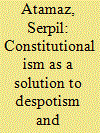

|
|
|
|
|
| Summary/Abstract |
This article contributes to the growing scholarship on the connections between the Ottoman and Iranian revolutions by exploring Ottomans’ reactions to and portrayal of the constitutional struggle in Iran. Based on an examination of primary sources that have not been utilized before, it reveals how an ideologically diverse group of intellectuals tried to link the two revolutions together in the Ottoman-Turkish press, focusing on shared problems and ideals. It demonstrates that undergoing a revolutionary process themselves, these intellectuals interpreted the events in Iran through the prism of their own experiences and used them to garner support for the constitutional regime at home. Through their depictions of the Iranian revolution, they not only portrayed the 1908 Revolution as part of a broader struggle against despotism and imperialism with significant implications for the Islamic world, but also conveyed the message that the Ottoman constitution needed to be supported and protected so that it did not fail like the one in Iran.
|
|
|
|
|
|
|
|
|
|
|
|
|
|
|
|
| 2 |
ID:
164909
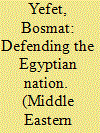

|
|
|
|
|
| Summary/Abstract |
This article discusses the Muslim discourse concerning the Coptic Christian minority since the 2000s in Egypt. Emphasizing the effects of the January 2011 uprising, the paper analyzes the role of nationalism and the national unity discourse in suppressing the debate regarding discrimination against the Copts. Despite the fissures that were created in the discourse, which rejects any reference to discrimination against the Copts, the Coptic issue remains trapped among the contested interpretations of national unity. All narratives of national unity and Egyptian essence, whether the official one pursued by the regime or the one promoted by pro-democracy activists, require the Copts to suppress their demand for rights for the sake of national unity. Adherence to the national unity discourse by all forces precludes the possibility of developing a form of nationalism or a national culture which embodies pluralism of identities and cultures and reinforces the role of nationalism as a tool for stifling pluralism and democracy for all Egyptians, whether Muslim majority or minorities.
|
|
|
|
|
|
|
|
|
|
|
|
|
|
|
|
| 3 |
ID:
164903
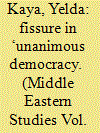

|
|
|
|
|
| Summary/Abstract |
The parliamentary politics of Turkey's one-party regime (1925–1946) has been described as a ‘unanimous democracy’, particularly on account of the absence of a voting opposition. Many scholars consider the Law for Providing Land to Farmers of 1945 as the first instance of parliamentary opposition in the one-party legislature. The current article challenges this widespread view and argues that property rights on land tended to provoke backlashes even before 1945. It examines the making of the deportation, land distribution and settlement laws of the 1920s and 1930s, all of which sanctioned intervention into property relations on land in the form of the expropriation of landowners. Going beyond an exclusive focus on voting patterns, this article traces parliamentary resistance by examining how government bills changed as they proceeded through both the reviewing committees and the general assembly. It links the birth of a full-fledged parliamentary opposition in 1945 to the previous waves of discontent and shows that property rights on land was a constant fissure in the early Republic's unanimous democracy.
|
|
|
|
|
|
|
|
|
|
|
|
|
|
|
|
| 4 |
ID:
164907
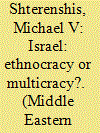

|
|
|
|
|
| Summary/Abstract |
Much of the recent academic literature that assesses democracy in Israel labels it either as incomplete or flawed, yet such literature employs minimal systematic analysis of how the state is actually governed. Since the 1990s, there has been a tendency to describe the Israeli political regime as an ethnocracy. This article argues that the term ‘ethnocracy’, when applied to Israel, has certain weaknesses and instead proposes the concept of ‘multicracy’ (multiformocracy) as a more appropriate term by which to describe Israel's political organization. It will demonstrate that existing Israeli democratic institutions do not control the state's policymaking in full and that several politically important processes are controlled or at least influenced by various other politically active forces. Whilst these forces can influence, stimulate, inhibit, and otherwise change governmental decisions and actions, they can be labeled as kratiae. While the capacity of Israel's democracy to govern is weak, these other kratiae can intervene in policymaking and the state's regime acts as democracy-dominated multicracy.
|
|
|
|
|
|
|
|
|
|
|
|
|
|
|
|
| 5 |
ID:
164906
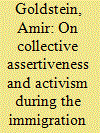

|
|
|
|
|
| Summary/Abstract |
This article focuses on the ways in which over 200 families of Yemenite immigrants, who founded the city of Kiryat Shmona, the development town situated at the edge of Israel's Northern District, functioned as a group during the immigration process. This case study coincides with the trend – within research of mass immigration to Israel – that relates the historical narrative through the perspective of the immigrant and settler groups, rather than from the vantage point of the establishment in charge of their absorption. The affair could have gone down in the annals of history as a story of weakness and victimhood: hundreds of immigrants were sent off to settle in an outlying peripheral region and were compelled to integrate into an environment where the financially and political-powerful kibbutzim were preponderant. Yet the Yemenite immigrants of Kiryat Shmona turned out to be a consolidated, opinionated, fighting and stubborn force that succeeded, in trying conditions, to assert their voice, struggle for their values and identity, affect major changes within the immigration–absorption system.
|
|
|
|
|
|
|
|
|
|
|
|
|
|
|
|
| 6 |
ID:
164902
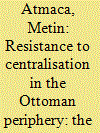

|
|
|
|
|
| Summary/Abstract |
Modern Kurdish historiography, which examines resistance to provincial centralisation in Ottoman Kurdistan, focuses largely on Bedir Khan’s Bohtan emirate and his revolt in the 1840s, while ignoring the rest of the other Kurdish emirates such as Baban emirate. While both states, Qajar Iran and Ottoman Empire, were endeavouring to solve their conflicts in the 1840s (a process which culminated in the treaty of Erzurum in 1847) the future of the Baban emirate and its territories emerged as one of the major issues during the course of negotiations. The Baban emirate was the last emirate to give up its struggle against the Sublime Porte’s centralisation reforms. The legacy of the Kurdish emirates is important to understand better the relations between the centre of the Ottoman Empire and its eastern periphery, a much less studied subject in Ottoman historiography. This article will highlight the impact of the centralisation policies in Kurdistan, more specifically on territories of the Bohtan and Baban emirates. It will be demonstrated that the changes wrought by the Tanzimat reforms were partially successful in transforming the Kurdish notables, who later became a part of the state bureaucracy. However, the reform-minded officials, who were appointed after the Kurdish emirs were removed from the region, failed to persuade the locals in favour of the new administration thus transforming their lives.
|
|
|
|
|
|
|
|
|
|
|
|
|
|
|
|
| 7 |
ID:
164905
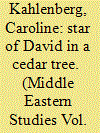

|
|
|
|
|
| Summary/Abstract |
The American University of Beirut's emergence as a hub of Arab national and cultural identity in the first half of the twentieth century has been well documented by historians. The simultaneous Zionist presence on campus has been largely overlooked. Zionist ideas were predominantly promoted by Palestinian Jewish students who formed a small but vocal minority at AUB prior to 1948. Faculty and non-Jewish students also regularly collaborated with and traveled to Zionist institutions in Palestine for academic, athletic, and leisure purposes. For Arab students on campus, therefore, Zionism was not an abstract concept, but rather a national identity embodied by fellow classmates and friends on campus. As the conflict in Palestine increased in the 1930s and 1940s, so too did political activism and tensions on campus between Zionist and Arab nationalist students. This article analyzes this unique period of exchange, collaboration, and friction at AUB, which came to a swift end with the outbreak of the 1948 War. By focusing on the interactions between Arab and Zionist Jewish students at AUB, I seek to extend the ‘relational’ approach towards Jewish-Arab contact beyond Palestine's borders.
|
|
|
|
|
|
|
|
|
|
|
|
|
|
|
|
| 8 |
ID:
164908
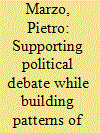

|
|
|
|
|
| Summary/Abstract |
This article focuses on a specific aspect of the international context surrounding the Tunisian transition to democracy. Through the case of the German political foundations in Tunisia, this study argues that the country’s journey to democracy has not been an exclusively domestic affair, but has also been the product of the engagement of international actors and their interplay with domestic groups. Building on evidence from semi-structured interviews and data triangulation the article shows that since the late 1980s four German political foundations operating in Tunisia created platforms for ‘political debate’ – alternative to the regime’s but not subversive – and encouraged political training. The article posits that initially the German political foundations helped Ben Ali’s regime in the making of a ‘façade liberalisation’, while in the long run their activities generated unintended consequences that in part undermined its ‘authoritarianism upgraded’. The article demonstrates that their longstanding presence on the ground allowed the German political foundations to develop patterns of trust with and between political and civil groups, ultimately improving the capacity of their action after the revolution.
|
|
|
|
|
|
|
|
|
|
|
|
|
|
|
|
| 9 |
ID:
164901
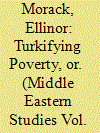

|
|
|
|
|
| Summary/Abstract |
This article shows that ‘Turkification’, a term widely used by historians of modern Turkey to refer to the forced transfer of property from Christian into Muslim hands, ought to be conceptualized not only in the sense of ‘enrichment’ but also, with regard to the working classes, as a process in which Muslim people inherited the poverty of their Christian predecessors. Taking İzmir as a case in point, the article first describes the plight of the overwhelmingly Christian working class prior to 1922. It then studies reports and editorials that discussed the economic and social situation in İzmir in the years 1923 to 1926, after the Turkish victory and forced migration of her Christian population. Over the course of these years, İzmir experienced a serious economic crisis, and bread prices reached levels that led to widespread undernourishment and hunger among the cityʼs poor. Agricultural production was lagging behind pre-war levels, and positive effects of ‘Turkificationʼ policies were failing to materialize. By analyzing the contemporary journalistsʼ attempts at explaining the crisis, but also pointing out national and transnational factors that they were probably unaware of, the article makes an original contribution to the economic and social history of early republican Turkey.
|
|
|
|
|
|
|
|
|
|
|
|
|
|
|
|
| 10 |
ID:
164900
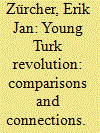

|
|
|
|
|
| Summary/Abstract |
This article consists of a comparative analysis on the one hand, and an attempt to trace influences and connections, on the other. In the comparative part, it seeks to determine the place of the Ottoman constitutional revolution of July 1908 in the global wave of revolutions in the decade before the First World War. It accepts that there is a high degree of similarity in the liberal constitutionalist ideology of the revolutionary movements, but emphasizes the differences in the social bases of the revolutionary movements. In the part on connections, the influences on the Young Turks' ideology, organisation and revolutionary methodology are traced, as well as the influence they exerted on other revolutionary movements.
|
|
|
|
|
|
|
|
|
|
|
|
|
|
|
|
|
|
|
|
|